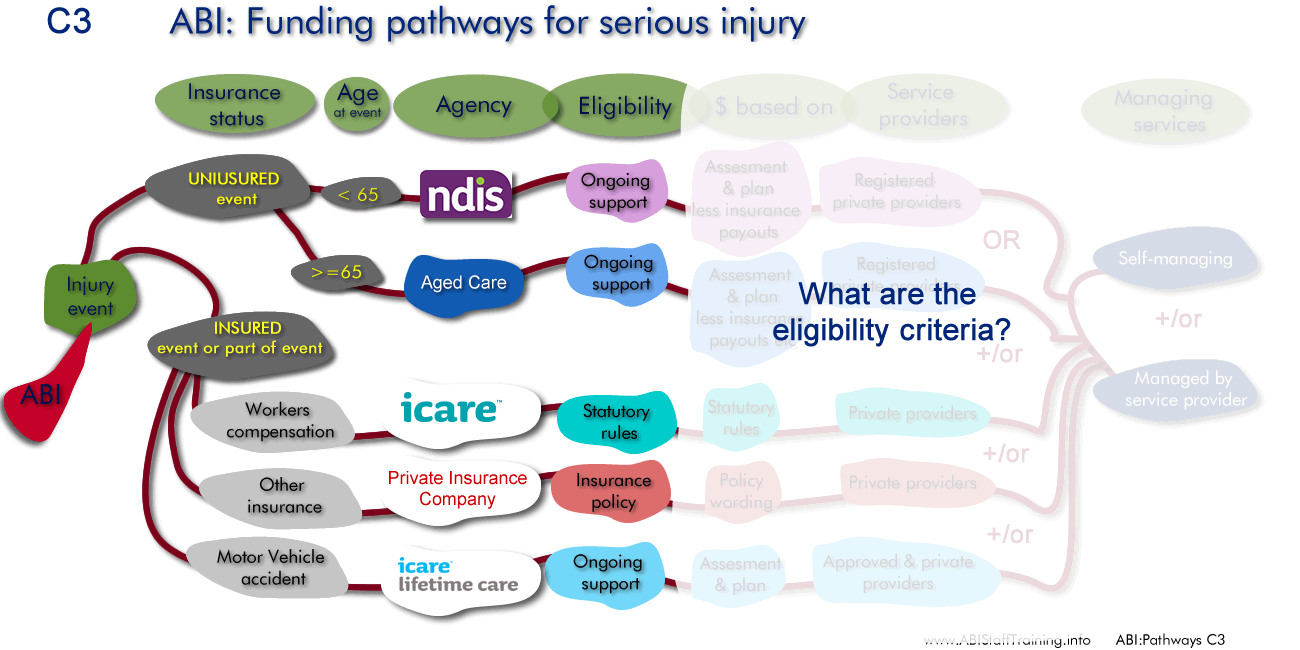
What are the eligibility criteria?
Each agency has its own eligibility criteria.
NDIS
The NDIS ensures that if someone is born with or acquires a permanent and significant disability they will get the support they need.
The NDIS supports people with disability to build skills and capability so they can participate in the community and employment.
Eligibility criteria include:
- Australian citizenship/residency/Protected Special Category Visa
- Age at acquiring disability (e.g. age at injury for ABI less than 65
- Usually need support from a person or equipment to do everyday things for yourself because of an impairment or condition that is likely to be permanent
- Need some supports now to reduce your support needs in the future?
Australian Government Aged Care Programs
There are Australian Government aged care programs:
- To support people living independently in their homes and
- To provide alternatives where they are unable to continue living independently in their own homes.
Eligibility criteria include:
- older person (usually 65+ or 50+ for Aboriginal and Torres Strait Islander people)
- finding it harder to do the things you used to do.
A face-to-face assessment of your care needs is required to determine if you are eligible.
Everyone who has an assessment through My Aged Care and is found to need services, is eligible to access services that: may be partly or fully funded by the Australian Government; and are regulated by the Australian Government.
If you need ongoing help with day-to-day tasks or health care, an aged care home lets you live in a supported environment where help is available 24 hours a day. The Australian Government contributes to the cost of aged care services. You’re expected to contribute if you can afford to. Costs vary for different types of care and different service providers. There are no standard costs for aged care services. How much you pay depends on: your financial situation the number and types of services you receive the service provider’s fees.
Eligibility and Assessment My Aged Care
icare (Workers compensation)
To be covered by workers insurance following a workplace injury or illness, you will need to provide medical evidence that indicates it was sustained as a result of your employment.
There are different types of claims a worker can make following a workplace incident. Different types of claims have different eligibility criteria. For example if you are claiming lump sum compensation for permanent impairment arising out of a psychological injury you need to be assessed as having a permanent impairment of 15% or more. However if you were claiming lump sum compensation for a physical injury you need to be assessed as having a permanent impairment of more than 10%. Claims for injuries that occurred during a work journey or on a work break have different eligibility criteria as well. All other workplace injury claims will be assessed on a case by case basis.
Eligibility to make a workers insurance claim
Private insurance companies
Eligibility criteria determined by conditions in the insurance policy.
There are many different types of insurance policies and conditions. Polices can include for example public liability, disability insurance, income protection insurance, etc
icare lifetime care
The lifetime care pays for treatment, rehabilitation and care for people who have been severely injured in a motor accident in NSW.
lifetime care is a no-fault scheme. This means support is provided regardless of who was at fault in the accident, as long as you meet our eligibility criteria for both your motor accident and your injury.
Eligibility criteria include:
- You were injured in a motor accident in NSW On or after 1 October 2006 (for children under 16) or on or after 1 October 2007 (for adults)
- Your injury was caused by the motor accident
- The type and severity of your motor accident injury meet the injury criteria Each application is assessed against specific criteria outlined in the Lifetime Care and Support guidelines.
Each application is assessed against specific criteria outlined in the icare lifetime care guidelines.
Severe injuries that may be eligible for the Scheme include: Spinal cord injury, brain injury, amputations, burns, permanent blindness